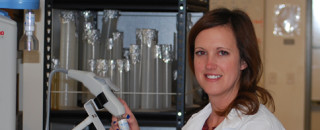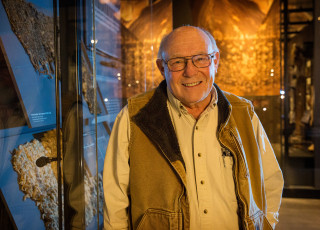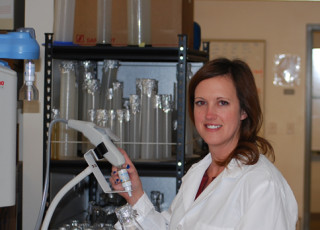Lecture Features the Science of Being Human
What makes us human? Three well-respected scientists will provide their perspectives on that profound question as part of the Natural History Museum of Utah’s lecture series “Nature of Things 2013: The Science of Being Human.” The lectures, scheduled March through April, will reveal the latest scientific research on what is unique to humanity, how humans came to be and humanity’s commonalities with other animals.
“We are incredibly pleased to present this compelling series to the community,” said Sarah George, executive director of the Museum. “We are providing a very rare opportunity for the public to have access to some of the finest minds and extraordinary research from the fields of microbiology, neuroscience, psychiatry and anthropology that are available today. These events are not to be missed by anyone who is interested in better understanding what makes us as humans tick.”
June Round, assistant professor in the Department of Pathology and the Division of Microbiology and Immunology at the University of Utah will present “Redefining Human: How Microbes Influence Who We Are,” Thursday, March 7 at 7:00 p.m. in the Salt Lake City Main Library, 210 East 400 South. In this free lecture, Round will discuss how bacteria influence human development and disease processes, and how these organisms may be used to treat various ailments. Given the importance of bacteria to human health, Round suggests people might begin to redefine themselves according to the microscopic creatures that inhabit their bodies.
David Eagleman, professor of neuroscience and psychiatry at Baylor College of Medicine will be the keynote speaker for the series with his presentation, “Knowing Thyself: What it Means to be a Human with a Brain,” Thursday, March 21 at 7:00 p.m. in Kingsbury Hall, 1395 Presidents Circle. Neuroscientist and bestselling author David Eagleman charts new terrain in neuroscience to demonstrate how many facets of being human all converge in the hidden workings of the brain. Tickets are $12 per person. University of Utah students, faculty and staff receive a 10 percent discount. Tickets are available at the Kingsbury Hall box office and www.kingtix.com.
Finishing off the series will be Brian Hare, associate professor of evolutionary anthropology and a member of the Center for Cognitive Neuroscience at Duke University. He will present a free lecture, “A Journey of the Mind: Asking Animals How We Became Human,” Thursday, April 11 at 7:00 p.m. in the Salt Lake City Main Library, 210 East 400 South. Hare will share research comparing the human mind to that of the bonobo and chimpanzee, as well as the minds of more distant relatives—dogs. Hare’s premise is that revealing the secrets of these species’ inner lives aids in understanding what makes humans unique and how the human mind came to be.
For more information visit www.nhmu.utah.edu
Sponsors who make this lecture series possible are: R Harold Burton Foundation, JPMorgan Chase, Rio Tinto/Kennecott Utah Copper, the Clark Foundation and Myriad Genetics. The series media partner is KCPW and all lectures can be heard live at KCPW 88.3FM.
About The Natural History Museum of Utah
The Natural History Museum of Utah at the University of Utah is one of the leading scientific research and cultural institutions in the Intermountain West. Established in 1963, the Museum cares for over 1.2 million objects and offers innovative exhibitions and educational programs to thousands of residents and visitors each year, including traveling and permanent exhibits, special events and other programs. The Museum has an active research program with more than 30 scientists and 10 field expeditions each year. Current Museum news is available on the Museum’s News Desk at http://newsdesk.nhmu.utah.edu/



